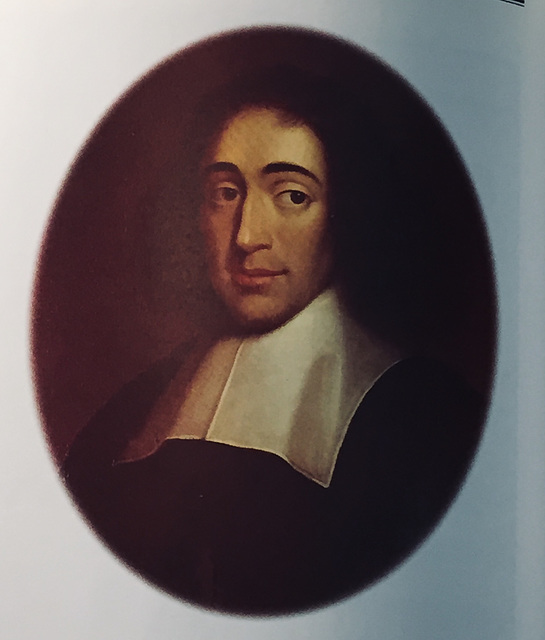FREEDOM OF EXPRESSION
LEIBNIZ WITH QUEEN SOPHIA CHARLOTTE OF PRUSSIA
VOILA D'AMORE
John Locke
Denis Diderot
IN THE EYE OF THE BEHOLDER
Knowledge of the External World
YALE UNIVERISTY
RULED BY THE HEART
A LADY AT HER MIRROR, JEAN RAOUX (1720s)
THE STROMING OF THE BASTIEEL
INTELLECTUALS GATHERING AT THE CAFE D'ALEXANDRE, P…
DECLARATIONS OF THE RIGHTS OF MAN
THE NATURE OF EXPERIENCE
Representation and Reality
ABOVE AND BEYOND
The LEGACY of SCHOPENHAUER
Mirror Test
Darwin's old study at Down
Checking the facts
THE PICTURE THEORY OF MEANING
QUEEN CHRISTINA OF SWEDEN & DESCARTES
THE GREAT RATIONALISTS
HOBBES
THE COPERNICAN SYSTEM
THE TRIAL OF GALILEO
Dalai Lama
Boethius and Lady Philosophy
Punishments !!
SAINT AUGUSTINE
διογένης / Diogenes
Color of Happiness
See also...
Keywords
Authorizations, license
-
Visible by: Everyone -
All rights reserved
-
14 visits
Benedict Spinoza


Spinoza was born in Amsterdam into a distinguished Jewish émigré family that had fled Catholic persecution in Portugal. He studied non-Hebrew subjects. Such as mathematics and linguistics, privately
plato.stanford.edu/entries/spinoza
iep.utm.edu/spinoza
www.gutenberg.org/files/3800/3800-h/3800-h.htm
plato.stanford.edu/entries/spinoza
iep.utm.edu/spinoza
www.gutenberg.org/files/3800/3800-h/3800-h.htm
- Keyboard shortcuts:
Jump to top
RSS feed- Latest comments - Subscribe to the comment feeds of this photo
- ipernity © 2007-2024
- Help & Contact
|
Club news
|
About ipernity
|
History |
ipernity Club & Prices |
Guide of good conduct
Donate | Group guidelines | Privacy policy | Terms of use | Statutes | In memoria -
Facebook
Twitter

Spinoza plato.stanford.edu/entries/spinoza was Jewish, the only Jewish before Karl Marx to occupy a position in the very front rank of original thinkers among Western Philosophers. . . . He proceeded to live a solitary life, earning his living by grinding and polishing lenses for spectacles, microscopes, and telescopes 00 at that time a new profession. His writings made him famous even so; but when he was offered a Professorship of Philosophy at Heidelberg University in 1673 he turned it down because he wanted to be left alone to do his philosophizing “in accordance with his own mind,” as he put it. ~ Page 90
. . . “the noblest and most loveable of great philosophers” - Bertrand Russell on Spinoza
”I have striven not to laugh at human actions, not to weep at them, nor to hate them, but to understand them” ~ Spinoza (Page 93)
This is a compelling vision, and many gifted people since Spinoza have come under its spell. His deification of nature had enormous appeal during the late 18th and early 19th century for the Romantic Movement, whose intellectuals made him one of their patron saint. Unlike the Romantics, however, Spinoza saw the actions of human individual as determined by factors outside his control, though not in any crude, mechanical way. With insight strikingly pre-visionary of Freud’s, Spinoza argues that our everyday sense of being free agents is an illusion based on the fact that we are not for the most part aware of the real causes of our actions; and that acquiring this awareness through reflection can liberate us, not in the sense of making us free agents literally but by giving us understanding and insight, and thus enabling us to come in terms with things as they are. He was the first person in Europe to put forward this idea. But at the same time, unlike Freud, he argued that it was absurd for individuals to be obsessed by their personal problems, these being merely petty concerns: we should try to see our problems as occupying the place they actually do in the totality of things; and when we do that we shall see them as insignificant -- and this will greatly help us to bear them. He has a memorable image for the idea that we should look at our own lives through the eyes of eternity: the Latin phrase he uses, ‘sub specie aeternitatis,’* is still often quoted ~ Page 94
* viewed in relation to the eternal; in a universal perspective.
Sign-in to write a comment.